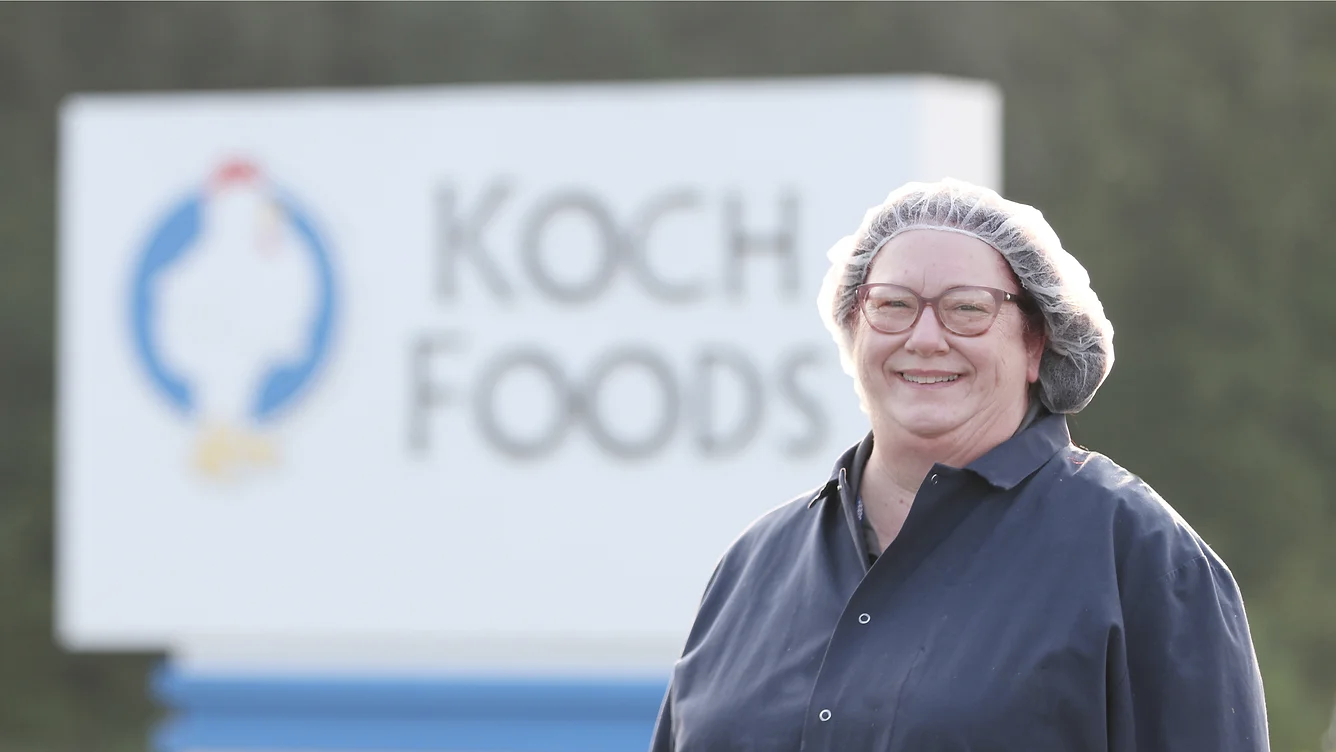By Caleb Hicks.
Thirty-nine years ago, an 18-year-old Ramona Harris got a job hanging chickens on the processing line at what was then Spring Valley Poultry, now Koch Foods, in Gadsden.
Today, Harris is still at the facility, but now as manager of the third shift, which runs 11 p.m. to 7 a.m.
“I basically make sure everything keeps running smoothly from top to bottom,” Harris said. “A little while after I started working here, I was going to school for nursing on the side, but one day, I changed my mind. After that, I never wanted to do anything else.”
She attributes her move up the ladder to years of hard work and dedication.
“I did everything I could to learn everything I could,” she said. “I stayed late after work and learned to do paperwork and had folks mentor me. There is so much opportunity in the poultry industry, and being able to show other women that they, too, can move up the ranks is very inspiring.”
As third shift manager, Ramona Harris keeps things running at the Koch Foods processing facility in Gadsden, where she’s worked for 39 years.
As of 2017, Alabama had 2,461 male principal poultry farmers to only 1,059 female. Terri Gilley of Holly Pond is one of them.
The Cullman County native started growing chickens in 1981 with one house. For her, it’s all about a challenge.
“I love the challenge that comes with working in the poultry industry,” Gilley said. “It’s tiresome, but you’ve got to be willing to work hard, pay attention to details and, most of all, be dedicated. You can’t expect everything to always be perfect.”
She now manages and keeps records for six poultry houses, and in her 31 years in the business, she has personally overseen every batch of chickens sold except one, and that was because of a visit to the emergency room.
For Gilley, the decision to start a farm was an easy one.
“It’s a blessing to be able to work in the agricultural industry and work for yourself,” she said. “I enjoy growing chickens and try to put my all in whatever I do. If I set my head to something, I’m going to do it.”
Cullman County native Terri Gilley owns and operates six chicken houses in Holly Pond and enjoys the fact she gets to run things her way. Gilley is shown here with her granddaughter, Caylee, who also helps out on the farm.
Down at Auburn University, Jessica Starkey is an assistant professor in the College of Agriculture’s poultry science department, where she manages a research lab and teaches multiple classes.
“My entire teaching philosophy centers around getting students to do their part and trying to motivate them to build skills they need,” Starkey said. “Our idea is that we want to give back and train students who can be productive and be leaders in the industry.”
Having grown up one of three daughters on a beef cattle ranch in rural Kansas, Starkey was accustomed to hard work and being productive. She said there was never any doubt in her mind she couldn’t do something because she was a girl, and she applies that to her teaching strategy.
“Getting students to think about what they’re doing and why they’re doing it is one of my main goals,” she said. “I see more and more young women finish our program and head into management trainee positions in the industry or end up as supervisors. That’s encouraging to me.”
Auburn University’s Jessica Starkey is a professor in the Poultry Science Department, where she manages a research lab and teaches several classes for the next group of up-and-coming poultry science students.
Sarah Ballard, a 2016 Auburn alumna in agricultural communications with a minor in poultry science and a former student of Starkey’s, is now a breeder field representative for Wayne Farms in Troy.
Ballard, who grew up around chickens in Crenshaw County, serves as a liaison between her five breeder farmers and the company, which she said is a small part of a bigger picture.
“It’s rewarding to me to think that I’ve made a difference somehow and have been able to help this huge industry,” she said. “It’s great to show young ladies you can be in this industry and can succeed and move up. My manager now is a female. It’s good to be able to say we can do the work and we can make a difference.”
To Ballard, being a part of Alabama’s largest agricultural industry means more than just a job.
“When you sit down to eat a meal with chicken on the table, it’s very fulfilling to be able to say that this is what I’ve been doing all day — helping this industry feed the world,” Ballard said. “The people I’ve met and the relationships I’ve made since starting in this industry are so valuable to me. I love what I do.”

